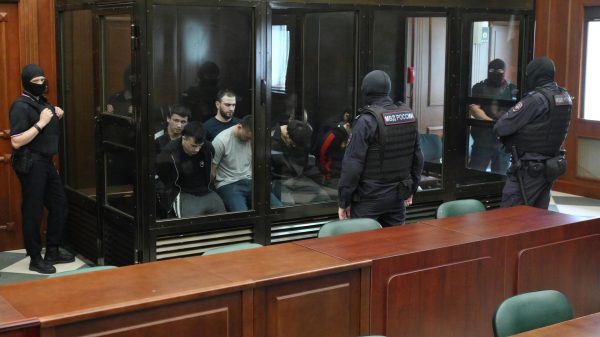 Longtime coaching opponents meet again on Sunday. Photo: Getty Images/Clive Rose
Longtime coaching opponents meet again on Sunday. Photo: Getty Images/Clive Rose
Eddie Jones and I have had some squabbling exchanges over the years.
When he took charge of England in 2016, I was probably the only one in charge a Six Nations coach with a reputation for throwing verbal grenades in the lead-up to matches. With the advent of Eddie, everything changed.
I remember standing behind him as we both walked into the press room at the opening Six Nations press conference and saying, «Come on Eddie, don't let me down, come out and throw some grenades!» He turned to me with a smile and said, “I'll wait until you go first.”
It was a little fun. Whenever I was with him at social events, I always found him to be good company. But we play professional sports, so there is a lot of rivalry, we are both competitive people and desperately want to beat our opponents.
Sometimes things may be said that may be misconstrued or misinterpreted, and the journalist may say, “That's already been said,” and although you didn't see the comments, at that moment you will be outraged by it. I guess this makes for interesting reading.
We also both know that not only does pantomime create interest in the game, but the use of verbal grenades can also be used to relieve stress from the player. players or send a message to them or an opponent.
I think when Eddie got the Wallabies job his job was to promote rugby union in Australia. Some of his recent feuds with the Australian media have caused controversy and generated a lot of headlines, but the flip side is that he has people talking about rugby in the country, people are involved and interested in what's going on.
Who knows what might be directed against us before Sunday's World Cup match? With so much at stake, the game promises to be amazing. I always enjoyed fighting him toe to toe.
There is no doubt that Eddie is very experienced and smart, and in England he had the luxury of coaching a team that had many more resources and players available to him. We, on the other hand, had to fight for everything we achieved and the titles we won, and this underdog mentality was positive for us: everything was earned, nothing was given to us.
I am also a very loyal person regarding my staff and players. I'm never going to throw anyone under the bus. If you speak out, I will support you.
Much of the success I've had as a coach comes from developing players over a period of time and creating an environment that they want to be a part of.
I'm not sure Eddie has always had the same philosophy. He has a significant turnover of coaches and staff and can only assume that he demands really high standards and pushes people to limits they are not ready for — and either they leave or they are taken away.
 Eddie Jones' It is known that methods lose their impact over time. Photo: Getty Images/David Rogers
Eddie Jones' It is known that methods lose their impact over time. Photo: Getty Images/David Rogers
I think there are both positives and negatives to this approach: it prevents people from becoming complacent and can have a short-term effect. But there is no doubt that in the past he has come into the environment and had success with the initial reaction of the group, but then it seemed to have a limited time frame due to how much pressure he put on the players and staff and dealt with it pressure. .
This is just me looking from the outside and talking to people who have worked with him in the past. However, what cannot be denied is that there have been times in his career when he has been very successful, sought after and deserving of respect.
He is also more than comfortable taking the pressure off his team. and his players, speaking with the media to create headlines defending his players.
This is what we have in common. I firmly believe in the effectiveness of sending hidden messages.
Often when someone is asked how they are, they respond, “Not too bad.” But what does this really mean? When people ask me how I'm doing, I always answer: “I'm fine.” The intention is that I want to send a positive message, no matter how small it may be. I want players to see me as someone who is calm, relaxed, confident, conveys confidence, can chase down an opponent and isn't afraid to say something.
Before the World Cup started, we were written off as a team off the books and I said I believe we can do something special. And I sincerely believe in this, but sometimes it happens that you have to take risks and prepare for public reaction.
But I am ready to do it if it will have some positive effect. influence on our players and coaches who stand tall and say to each other: “Yes, he is right.”
As a head coach, it's important to use all the tools you have in your box, and sometimes that means taking the pressure off the players and putting it on me. I'm always happy to do it if it's the right thing for the team, but sometimes it's difficult mentally because the criticism that comes your way can be overwhelming.
In the past I have criticized opposing players. And sometimes I went too far. This is the single biggest question I have about myself. There have been times when I've kicked myself for saying something that I later regretted or felt like I didn't phrase the comment properly and it resulted in a big headline.
The worst of them is probably , there was a grenade thrown at me. Dylan Hartley, former England hooker, back in 2011.
I didn't like some of the comments he made in a complaint against Wales scrum-half Richie Rees for gouging out his eyes. His reaction to the alleged incident as described in the report didn't quite sit well with me — he was supposed to be a tough front row forward and a Kiwi boy who grew up in Rotorua.
So I made a couple of comments. questioned his temperament before our game against England in Cardiff and he came out and embarrassed me by playing amazingly well. I have crossed all boundaries. But the first thing I did when I saw him after the game was go up and apologize to him. I shook his hand and told him I thought he had played brilliantly and apologized for going overboard. Isn't that what the game should be about?
RWC Promo Book
























































Свежие комментарии